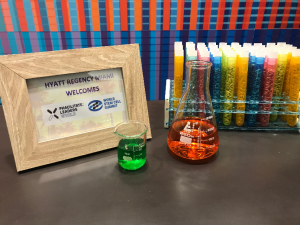
This is the first time in history that we can make more effective medicines than we can afford, says Dark Horse Consulting.
The Phacilitate conference took place in Miami this week, and in the plenary session Anthony Davies, founder of cell and gene therapy specialist firm Dark Horse Consulting, described the latest developments in the field of regenerative medicine.
With the approvals of Kymriah (tisagenlecleucel), Yescarta (axicabtagene ciloleucel) and Luxturna (voretigene neparvovec) in 2017, “this field finally had the year we’ve been saying we’ve been going to have for years,” he told delegates in Miami, Florida. And in 2018 the products both began treating patients and bringing in revenues for Novartis, Gilead and Spark Therapeutics.

The Phacilitate conference took place in Miami, Florida this week
“Patients are being treated and biotech and pharmaceutical companies are being paid for treating them. This is the cycle of life in pharma development. We all know there were approved cell and gene therapies approved prior to Kymriah, Yescarta and Luxturna but we also know that these three approvals were a singular milestone in the development of the field.”
However, Davies warned that industry and government are yet to balance the huge costs of these new curative therapies.
“The field of medicine is for the first time in the history of our planet at a position where we can make more effective medications than we can afford.
“This is not a first world thing necessarily, but if you dispute that math then just consider the second and third world. What’s different is the medicines that we can make are effective and they are becoming so abundant that if you look at the global GDP we can’t afford them.”
He attributed the problem not to “greed and pharmaceutical margins” but to the high cost of goods sold (COGS), or manufacturing costs, in addition to development costs.
“I believe that this field is in danger of sleepwalking into a cost of goods’ crisis. I believe that poses as big a threat to the forward motion of this field as anything.”
Novartis, Avexis and $5 million per patient
When Novartis launched Kymriah, the firm received criticism for the $475,000 price tag. Yescarta has a slightly lower list price of $373,000, but the next cell and gene therapies to reach commercialization could have prices 10 times more.
Avexis – which Novartis acquired last May for $8.7 billion – has a lead candidate Zolgensma (onasemnogene abeparvovec), previously known as AVXS-101 – in development for the treatment of spinal muscular atrophy (SMA). Dave Lennon, president of AveXis, said last November Zolgensma could have a price in the range of $4 million to $5 million per patient if it reaches the market.
Lennon reinforced this position when quizzed by Davies during the plenary session at Phacilitate, and while he stressed no pricing strategy has been decided at Avexis, he argued such a high price tag would still be cost-effective.
“We really have therapies now that do something completely different and I think we need to recognize and properly value those,” he said. The firm has carried out a cost analysis for Zolgensma, which has been independently validated, and the product is “worth that amount of money,” he continued.
“The reality is healthcare systems spend this type of money on caring for diseases all the time,” he said, describing the high and long-term costs of treating and caring for patients with cancer and chronic diseases.
“There is actually this money already being spent in the system. We just happen to put it into one box which creates a lot of transparency around how much it costs to care for these kind of cases.”
About the Author
You May Also Like

schedl_b_and_w.jpg?width=100&auto=webp&quality=80&disable=upscale)
schedl_b_and_w.jpg?width=400&auto=webp&quality=80&disable=upscale)



